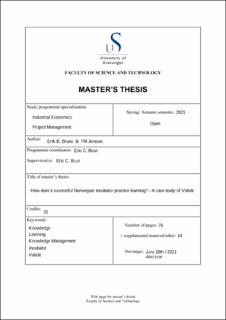How does a successful Norwegian incubator practice learning? - A case study of Validé
Master thesis
Permanent lenke
https://hdl.handle.net/11250/2774760Utgivelsesdato
2021Metadata
Vis full innførselSamlinger
- Studentoppgaver (TN-ISØP) [1451]
Sammendrag
Incubators have a purpose of increasing the success rate of start-up companies and entrepreneurs. Several countries, including Norway, have invested in the development of innovation as this is acknowledged to be a key contributing factor to nations’ economies. Studying successful incubators may provide useful information on how other incubators can improve. As research has shown, incubators may function differently depending on the culture they operate in. Little research has been done on learning within incubators in a Norwegian context. Therefore, this thesis studies a successful Norwegian incubator and how they practice learning with the purpose of identifying key factors for their success. This single case study compares existing literature on knowledge, learning, and incubation with findings from qualitative interviews with employees working in the incubator department in the Norwegian innovation company Validé. Seven business advisors, a fund director, and the CEO of the company were interviewed. Comparisons between literature and findings from the interviews showed that learning takes place in a variety of different ways in Validé. This study suggests that key factors to Validé's success include close collaboration between colleagues, openness and transparency in the organization, low internal competitiveness, engaged and active leadership, and a strong organizational culture. This study also points out other factors that are difficult for other incubators to copy. Findings show that factors such as current resources, historical point in time, and location may have an effect on the incubator's success. Incubators have a purpose of increasing the success rate of start-up companies and entrepreneurs. Several countries, including Norway, have invested in the development of innovation as this is acknowledged to be a key contributing factor to nations’ economies. Studying successful incubators may provide useful information on how other incubators can improve. As research has shown, incubators may function differently depending on the culture they operate in. Little research has been done on learning within incubators in a Norwegian context. Therefore, this thesis studies a successful Norwegian incubator and how they practice learning with the purpose of identifying key factors for their success. This single case study compares existing literature on knowledge, learning, and incubation with findings from qualitative interviews with employees working in the incubator department in the Norwegian innovation company Validé. Seven business advisors, a fund director, and the CEO of the company were interviewed. Comparisons between literature and findings from the interviews showed that learning takes place in a variety of different ways in Validé. This study suggests that key factors to Validé's success include close collaboration between colleagues, openness and transparency in the organization, low internal competitiveness, engaged and active leadership, and a strong organizational culture. This study also points out other factors that are difficult for other incubators to copy. Findings show that factors such as current resources, historical point in time, and location may have an effect on the incubator's success.
